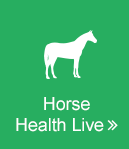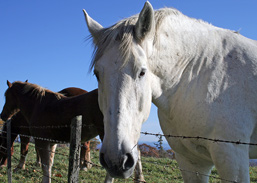Most people are familiar with the pain of heartburn and this common affliction is also a problem for horses. More than 50% of horses experience some kind of gastric ulcer in their lifetime and that figure can be much higher in active competition horses especially racehorses, endurance horses and show horses. Even horses that do not get a great deal of exercise can be bothered my stomach ulcers from stressful changes in their routine. Horses evolved to graze on small amounts of food throughout the day so they have relatively small stomachs and produce a lot of stomach acid to continually break down forage. When we keep domestic horses on a schedule where they work during the day and only eat two large meals, stomach acid production does not change. Hard working horses are most commonly bothered by acid reflux because physical activity can cause stomach acid to move up toward the upper (non-glandular) and more sensitive parts of the stomach. Stress, travel and medications can also increase stomach acid levels which leads to erosion of the lining of the stomach – ulcers.
Horses with ulcers feel a lot of discomfort so symptoms include decreased appetite, decreased enthusiasm for work, teeth grinding, poor body and coat condition, weight loss and minor colic. If your horse is showing these symptoms it is best to call a veterinarian. The vet can diagnose ulcers by sedating the horse and passing an endoscope down their esophagus to examine the GI tract. Horses with ulcers do best when feed multiple small meals per day so food in the stomach utilizes the stomach acid preventing it from eroding the stomach lining. Limiting oral anti-inflammatory drug use and stressful situations can help reduce stomach acid production. Talk to your vet about antacid medications that will help sooth your horse’s stomach.
Studies
ImproWin® in the treatement of gastric ulceration of the squamous mucosa in trotting racehorses.
Endoscopic findings of the stomach in pleasure horses in Poland.
Cholangiohepatitis and pancreatitis secondary to severe gastroduodenal ulceration in a foal.


